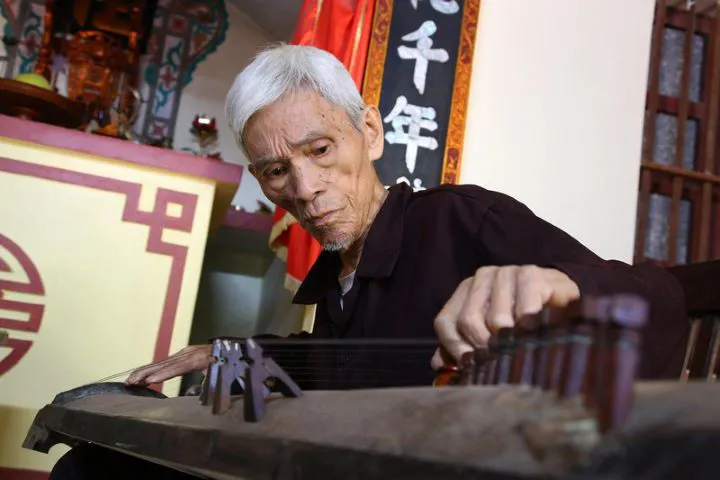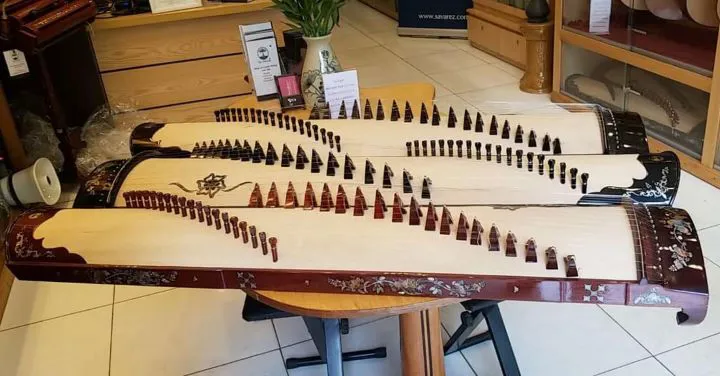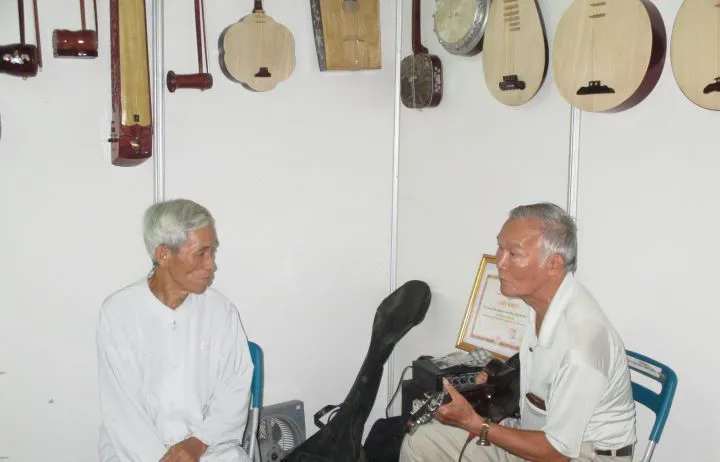Dao Xa artisans strive preserve ancestors’ legacy
Making musical instruments is the traditional trade in Dao Xa Village that has been passed down from generation to generation. The artisans are now striving to preserve their ancestors’ legacy.
The taste of music enjoyment among young people in Vietnam is changing nowadays. Western musical genres are prevailing over traditional music and performing arts.
The trend is taking its toll on the centuries-old profession of making traditional musical instruments in Dao Xa Village, Ung Hoa District on the outskirts of Hanoi. Seeing the trade slowly falling into oblivion, the artisans of Dao Xa Village are now striving to preserve their legacy.
The farming artists
| Artisan Dao Van Soan can make and play all types of Vietnamese traditional music instruments. Photo: Dan tri |
Artisan Dao Van Soan is wearing a short-sleeve T-shirt as he planes and carves wood in his home-based workshop on a slightly chilly early winter afternoon. Soan is one of the few talented and famous instrument-maker left in Dao Xa village.
I ask to buy a Vietnamese two-chord guitar, and he points to a pile of wood: “I am making some new ones but they are not assembled, the finished has just been delivered to the customer”.
Dusting his hands, and inviting me to sit at a table, he says haltingly: “Some years before the pandemic, I only sold the instruments to customers who directly came to my house to place orders and return to pick up the finished product. The production by that time, however, could not catch up with the demand.”
“How about now?” I asked. Soan did not answer my question but takes out Nhi, a traditional musical instrument, and starts to play, his head shaking like a real artist with a traditional operetta.
“How do you adjust the strings and tone?” I want to know. “I do following the experience of ancestors. I learn and make these on my own without any schooling. I don’t know anything about musical theory,” Soan says, laughing, exposing his golden teeth.
At the age of 79, the clever old man is considered one among the last artisans who still practice the trade in Dao Xa village nowadays. With the experiences passed down from his predecessors, he is able to make various kinds of traditional Vietnamese instruments, from the Dan Bau (Vietnamese monochord), Dan Nhi (or Vietnamese two-string violin) to Dan Day - Vietnamese three-strings guitar and Dan Tranh - the Zither, among others.
| The artisan plays a Dan Tranh made by himself a long time ago. Photo: Dan tri |
Outside the gate, under a vine trellis, the small workshop of 55-year-old Dao Ngọc Khuong is cluttered with pieces of wood and equipment including a drilling machine, saw, guitar boxes, vibrator and rolls of string.
He is sitting on a bench using emery paper to polish a Dan Bau, a Vietnamese two-chord guitar that has just been taken out of the mound.
Leading me into his house, he takes out many finished musical instruments from a cupboard two-chord fiddle, two-chord guitar, and so on. Noticing my interest in an electrical monochord, he takes out a system of loudspeakers on the top of the cupboard, plugged the jack cable to the speakers and the monochord, and proceeded to play an entire traditional song as if he was a professional musician.
The secret of the trade
Except for Soan, who is a retired teacher and considered a man with a broader knowledge of music, the other craftsmen making musical instruments in Dao Xa are farmers. Making these instruments be extra work they do when they have the time.
With different types of wood including maize and rosewood, the residents of Dao Xa use their talented hands and sensitive ears to produce many traditional musical instruments as well as modern guitars. “They produced magic sounds that please the ear of any customer,” says Soan.
According to Soan, Dao Xuan Lan is the ancestor who introduced the trade-making musical instruments to the village in the French colonial time during the 18th and 19th centuries.
He was later employed by a Frenchman in Hanoi and achieved his fame in the capital city. When Lan passed away, Dao Xuan Ai, who was the great grandfather of Soan, continued his footsteps.
| Soan's tiny house-cum-workshop is always loaded with Vietnamese musical instruments, awaiting to serve clients. Photo courtesy of the artisan. |
He established a store to make and sell musical instruments named “Trung Hoa” at 51 Hang Ga Street in Hanoi. Trung Hoa was a famous trademark for traditional musical instruments even in France, and “if anyone has one today, it will be valuable” Soan says eagerly, “because the items were stamped with a trademarked seal”.
However, after Ai, the famous Trung Hoa products became history. No one among his sons could realize they secretly handed down the techniques for making the Trung Hoa musical instruments.
In his almost five decades of making a musical instrument, Soan has mentored dozens of artisans, but he says the really good ones can be counted on the fingers of two hands. Khuong is one among them.
The artisans who Soan deemed as graduates from his training need to have exquisite hearing and sharp eyes alongside their talents in carpentry. All the stages of making traditional musical instruments require artisans a lot of effort, from the wood selection, the instrument shaping to the refining stages.
The artisans must strictly adhere to traditional techniques in order to create an instrument of the highest quality.
Soan is the third generation practicing the trade that was handed down by his forefathers. However, only one of his three sons- Dao Van Tuan is following his trade.
Striving for trade preservation
| A musical instrument costs a million thousand dong if bought in Dao Xa village, but it could be double or even triple when buying in big stores in Hanoi’s downtown. Photo: Dao Tuan |
Although the traditional vocation of producing musical instruments helps Dao Xa farmers earn extra income, it could not make them rich. Over 85% of traditional musical instruments sold in Hanoi's Old Quarter area are made by Dao Xa artisans.
However, the price is dirt cheap, only a few hundred thousand dong each if bought in the village. The same items cost millions of dong in big stores in Hanoi’s downtown.
Currently, there are less than 10 households in Dao Xa village who are still engaged in making musical instruments while not so many young villagers want to pursue the age-old profession.
Besides, not everyone is able to learn the craft of making traditional musical instruments, according to Tuan, Soan’s oldest son. Tuan has just been learning his ancestor’s craft for about 10 years, only when he got old and did not want to pursue his main career as a car driver anymore.
| Before the pandemic, artisan Dao Soan usually traveled to Hanoi to display his musical instruments at cultural exhibitions. Photo: Dao Tuan |
“Diligence, sophistication, and meticulousness are the necessary virtues of an apprentice of traditional musical instrument-making,” he said.
“Vietnamese musical instruments made by Dao Xa artisans not only meet aesthetic requirements but also produce good sound. Therefore, those who lack natural abilities or diligence will not be able to follow the profession,” he added.
In addition, raw materials for the production of musical instruments become scarce, besides, the demand for traditional musical instruments is low in the modern days. That has forced the artisans in Dao Xa village to gradually switch to other jobs with higher incomes.
“Each country has its own music, which makes up its cultural identity. My lifelong desire is to be able to pass on the craft to as many people as possible. I don’t care about the tuition but preserving the trade,” Soan stated.
If not for the money, one can only hope that the love of music will keep this traditional vocation alive and well in Dao Xa Village for many years to come.







![[Uniqueness of Hanoi's craft villages] Artisan brings Vietnamese silk to a new height](https://cdn-media.hanoitimes.vn/2021/08/11/Cover_2.png?w=480&h=320&q=100)
![[Uniqueness of Hanoi's craft villages] Hanoi artisans strive to preserve traditional craft](https://cdn-media.hanoitimes.vn/2021/11/07/cover_1_new.jpg?w=480&h=320&q=100)








